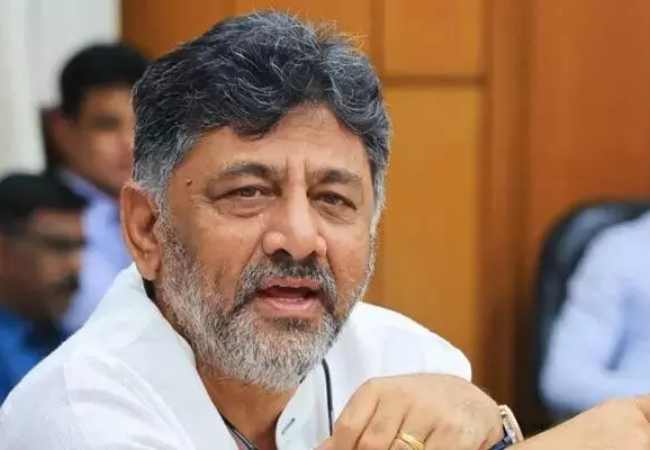Chennai, May 25: DMK president M K Stalin Saturday said no single state can be ignored by the government at the Centre and asserted India was not Hindi speaking states alone.
Buoyed by his party's performance in the Lok Sabha election, the Dravidian party chief for the first time said his party would take the initiative to oppose the BJP -albeit without naming it explicitly- in other states by working with outfits in those regions.
"The DMK will take constructive measures to replicate the Tamil Nadu model (of propping up secularism and DMK's victory in polls) in other states as well by coordinating with forces committed to communal harmony," he said in an open letter to party cadres.
On a day when Prime Minister Narendra Modi was elected leader of the NDA, Stalin said this was the time to support and embrace people of all identities, states, adding "the days that Hindi speaking states alone was India has vanished."
The future was all about "constructive politics that centred around the states," the DMK chief said.
"No single state can be ignored whichever party took over reins of power at the Centre," Stalin asserted.
The DMK's voice will reverberate in Parliament and State Assembly to protect the people's interests, he said.
The DMK has won 23 seats and the front (Secular Progressive Alliance) led by it has won 37 of 38 seats in Tamil Nadu and the lone seat in Puducherry (Congress) as well.
DMK will continue its "journey of victory," to protect people's interests, he said.
The historic win of his party-led front in the Lok Sabha polls showed the "secular approach," of the people which was nurtured by Dravidian stalwarts including reformist leader Periyar E V Ramasamy.
The people's verdict in Tamil Nadu showed that Dravidian movement -a reference to the DMK and a pointer to the Dravidian ideology which includes secularism and social justice- can never be decimated, he said.
As regards AIADMK's jibe that despite good showing in the polls, DMK's goal has not been realised, he said it was a "reflection of the frustration of the ruling party and political rivals."
The DMK had vowed to return to power in the state by winning the bypolls to all the 22 Assembly seats and strongly pitched for a government led by Congress president Rahul Gandhi at the Centre.
Apart from emerging as the third biggest party in the Lok Sabha, the DMK has wrested 12 seats from the AIADMK pushing its total strength in the Assembly to 101, Stalin said.
The DMK retained Tiruvarur in the by-elections and totally won 13 constituencies in the Assembly bypolls while the ruling AIADMK won 9 segments warding off the probability of threat to its government.
The AIADMK's strength has now risen to 123 while 118 members are enough for a simple majority in the 234-member House.
Stalin credited the DMK's victory to party workers and support of allies including the Congress.
Let the Truth be known. If you read VB and like VB, please be a VB Supporter and Help us deliver the Truth to one and all.
Bengaluru (PTI): Karnataka has proposed a new Information Technology Policy for 2025–2030, offering extensive financial and non-financial incentives aimed at accelerating investments, strengthening innovation and expanding the state's tech footprint beyond Bengaluru.
The Karnataka Cabinet gave its nod to the policy 2025–2030 with an outlay of Rs 445.50 crore on Thursday after the Finance Department accorded its approval.
The policy introduces 16 incentives across five enabler categories, nine of which are entirely new, with a distinctive push to support companies setting up or expanding in emerging cities.
Alongside financial support, the government is also offering labour-law relaxations, round-the-clock operational permissions and industry-ready human capital programmes to make Karnataka a globally competitive 'AI-native' destination.
According to the policy, units located outside Bengaluru will gain access to a wide suite of benefits, including research and development and IP creation incentives, internship reimbursements, talent relocation support and recruitment assistance.
The benefits also include EPF reimbursement, faculty development support, rental assistance, certification subsidies, electricity tariff rebates, property tax reimbursement, telecom infrastructure support, and assistance for events and conferences.
Bengaluru Urban will receive a focused set of six research and development and talent-oriented incentives, while Indian Global Capability Centres (GCCs) operating in the state will be brought under the incentive net.
Incentive caps and eligibility thresholds have been raised, and the policy prioritises growth-focused investments for both new and expanding units.
Beyond incentives, the government focuses on infrastructure and innovation interventions.
A flagship proposal in the policy is the creation of Techniverse -- integrated, technology-enabled enclaves developed through a public-private partnership model inside future Global Innovation Districts.
These campuses will offer plug-and-play facilities, artificial intelligence and machine learning and cybersecurity labs, advanced testbeds, experience centres, and disaster-resistant command centres.
There will also be a Statewide Digital Hub Grid and a Global Test Bed Infrastructure Network, linking public and private research and development, and innovation facilities across Karnataka.
The government has proposed a Women Global Tech Missions Fellowship for 1,000 mid-career women technologists, an IT Talent Return Programme to absorb experienced professionals returning from abroad, and broad-based skill and faculty development reimbursements.
Shared corporate transport routes in Bengaluru and tier-two cities will be designed with Bengaluru Metropolitan Transport Corporation and other transport entities to support worker mobility.
The government said the policy is the outcome of an extensive research and consultation process involving TCS, Infosys, Wipro, IBM, HCL, Tech Mahindra, Cognizant, HP, Google, Accenture and NASSCOM, along with sector experts and stakeholder groups.
It estimates an outlay of Rs 967.12 crore over five years, comprising Rs 754.62 crore for incentives and Rs 212.50 crore for interventions such as Techniverse campuses, digital grid development, global outreach missions and talent programmes.





